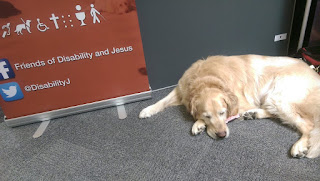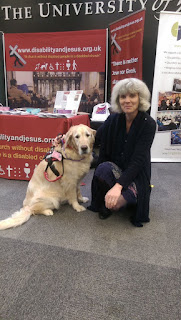Please don't misunderstand me here, I have a very thick skin and in no way do such phrases hurt me, I'm a rough tough Geordie lad and it would take far more than that I just feel that to use such phrases perpetuates a perception in people's minds that to be blind must be far more terrible than it really is.
This theory of mine also has a lot to do with our collective misunderstanding of the difference between healing and cure, two words that many have come to regard as somehow interchangeable where as I see them as radically different. To understand what the gospel has to teach us about healing and cure we must first realise that we are talking about two completely separate things.
When I was first given the news of my sight loss back in 1987 I was angry, confused, hurt and as a result spent years in what I can only now describe as a rage, lashing out, hurting others, blaming others, wanting others to experience some of the pain I was feeling.
It took me until the year 2000 to calm down sufficiently to even contemplate that I was going blind and that I should begin to explore what help might be out there, until that point my response had simply been to tell the whole world to F off!
Eventually in 2001 I was matched with my first guide dog Abbot.
Abbot was a very special being, in a very short space of time he took away all the anger, the bitterness, the sense of unfairness, to this day I still don't really know how he did it but I remain totally convinced that he did. This for me was a healing. It made what had been previously unbearable, bearable. More than that my blindness became part of my identity that I embraced, my blindness informs who I am, it causes me to place my faith and trust in a God that leads me who knows where in complete safety and love, it took Abbot to teach me that.
So now some 30yrs on I can say to people my blindness has been healed, not cured but healed. It is no longer the monster that rules my life, fills me with rage and sets me running. My blindness is now something that informs my faith, it helps me relate to others, it causes me to trust. It is by far more than just a negative. So much so that I don't believe in a Disney heaven where my sight will be fully restored, I'll be a guide dog owner in heaven too, it is part of who I am.
So back to this idea of banning the use of blindness related terms in every day conversation. I believe that such use contributed to the view I used to have of blindness before it actually happened to me. Everyday expressions had taught me to believe that to be blind was failure, was ignorance, was a refusal to see. I now know this to be far from the truth, so if you can see this too please join me in my campaign.
























